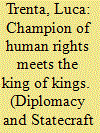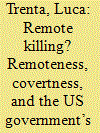|
|
|
Sort Order |
|
|
|
Items / Page
|
|
|
|
|
|
|
| Srl | Item |
| 1 |
ID:
124191


|
|
|
|
|
| Publication |
2013.
|
| Summary/Abstract |
Building on the recent re-discovery of the Iranian Revolution, this analysis examines the policies of the Carter Administration and their effects on Iran and the Iranian opposition. Starting with Jimmy Carter's election and hopes for a new era in American-Iranian relations, there occurred the progressive creation and expansion of a rift between the Carter Administration and the Iranian opposition. This rift was exacerbated by stubborn American support for an increasingly weak Shah, and by the complete unwillingness, both in Washington and at the American Embassy in Tehran, to meet with opposition members, let alone with Ayatollah Ruhollah Khomeini. In this sense, the horizon of the analysis of the origins of the Iran hostage crisis is expanded with a longer-term perspective. The taking of the hostages represented the final act of a troubled relationship that had probably begun before Carter took office.
|
|
|
|
|
|
|
|
|
|
|
|
|
|
|
|
| 2 |
ID:
157744


|
|
|
|
|
| Summary/Abstract |
Starting in 2010, the Obama administration engaged in an effort to justify drone strikes relying on the concept of ‘imminence’. The aim of this article is to understand the reasons behind such insistence and to assess the administration’s efforts at conceptual change. Building on Skinner’s and Bentley’s work, the article argues that the administration has followed an ‘innovating ideologist’ strategy. The analysis shows how waves of criticisms exposed the administration to a key contradiction between its rhetoric of change that emphasised international law and the need for aggressive counterterrorism. Reacting to this criticism, the administration has relied on imminence due to its connection with legitimate uses of force, while working to change the criteria for the concept, causing a shift away from imminent as ‘immediate.’ Reassessing Skinner’s place in IR, the article identifies conceptual change as a lens to assess foreign policy rhetoric and practice. The analysis emphasises the connection between actors’ intentions, beliefs, and practices. It highlights the importance of criticism in engendering contradictions, exploring why only some criticisms are confronted. Finally, the article develops an original typology of the limits confronted by the innovating ideologist and methods to assess whether the actor has respected them.
|
|
|
|
|
|
|
|
|
|
|
|
|
|
|
|
| 3 |
ID:
181631


|
|
|
|
|
| Summary/Abstract |
The recent assassinations of General Soleimani and Mohsen Fakhrizadeh have renewed debates surrounding governments’ use of assassination. Some commentators have interpreted these episodes as an escalation in practices of “remote warfare.” Recently, the literature on remote warfare has expanded to include multiple activities at – and below – the threshold of war. From its original focus on geographical distance, “remoteness” now encompasses the “political” distance of deployments of force. In this understanding, “remoteness” has blurred the line separating the methods used to deploy force and the ways – overt or covert – in which they are deployed. Having highlighted the role of covertness, this article establishes that assassination should be included in the “remote warfare” canon. A study of the US government’s involvement in assassination permits us to elucidate the interplay between remoteness and covertness. The article shows that a deeper engagement with the assassination as a tool of US foreign policy provides two main advantages. First, it permits us to better historicise the “opacity” and “political distance” of practices associated with “remote warfare.” Second, it helps unveil the origins of the legal, political, and technological infrastructures that currently sustain much of the US government’s global “remote wars.”
|
|
|
|
|
|
|
|
|
|
|
|
|
|
|
|
|
|
|
|
|